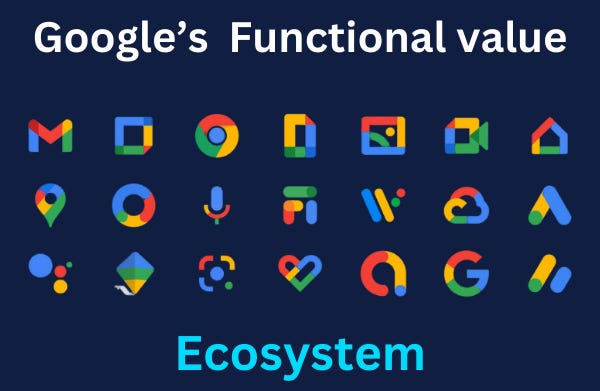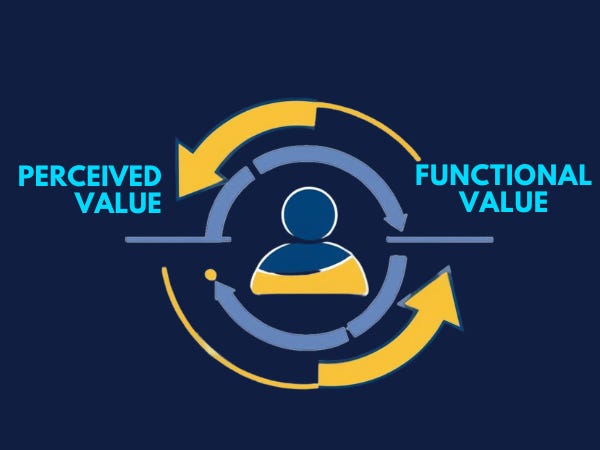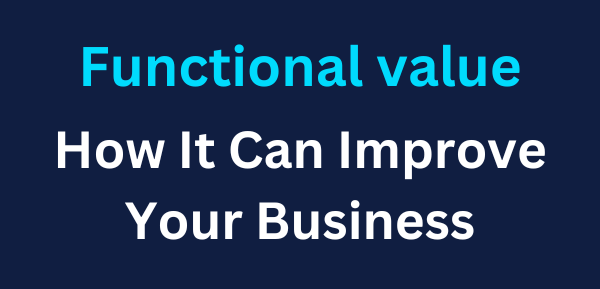Functional value is very common within service-based businesses.
Obviously, there are cases where product-based businesses create such value, especially when they have a unique tech or innovation advantage.
This is because to create functional value (practical benefits, performance, and usability), you have to be the best in your field.
Let’s start.

What is Functional Value?
Functional value is the real, tangible benefit a service provides.
It focuses on answering the following:
- Does this product solve my problem efficiently?
- Is it faster, easier, or more reliable than other options?
- Does it provide measurable improvements in my daily life or work?
Unlike perceived value, which can be created by emotional perception, functional value is based on performance.
The issue is that customers are often less attached to functional value compared to perceived value.
Once a better, faster, or cheaper option emerges, customers are more likely to switch.
This is why companies that rely only on functional value must constantly innovate to stay ahead.
Some of the world’s biggest companies have built their success not just on marketing but on offering undeniable functional advantages. The best examples? Google.

Google: The Ultimate Functional Value Provider
Google dominates the search engine market because it provides the fastest, most relevant search results with an easy-to-use interface.
Here’s why Google’s functional value is unmatched:
- Speed & Accuracy: Google delivers search results in milliseconds with highly accurate and relevant links. Competitors may have similar features, but none match Google’s efficiency.
- Smart Algorithms: Google’s AI and machine learning continuously refine search results, ensuring users get the best possible answers.
- Integration: From Gmail to Google Maps, Docs, and Drive, Google’s ecosystem provides seamless, functional benefits that keep users coming back.
People don’t use Google just because of branding, they use it because it solves a problem better than any alternative.
But, if a competitor offered a search engine that was significantly faster, cheaper, or more efficient, Google’s dominance could be challenged, like ChatGPT is doing after 20 years of dominance.

Functional vs. Perceived Value: Why Both Matter
While functional value ensures customers choose a product for its usefulness, perceived value creates long-term brand loyalty.
You don’t have to choose one over the other; together, you can really create an incredible brand.
A company that builds only on functional value is at risk of being replaced by a superior competitor. A brand that builds perceived value alongside functional excellence, however, creates emotional attachment and customer loyalty.
For example:
- Google’s ecosystem creates incredible functional value, but Apple’s ecosystem creates perceived value. apple’s users stay loyal not just because of functionality but because of the brand’s attachment.
- Amazon thrives on functional convenience, but luxury brands like Rolex or Louis Vuitton thrive on perceived value.
The question is, why do you choose specific service businesses?
If the answer is because they are the best and most convenient, then the value is functional.
If you buy it because you love the brand or enjoy how it makes you feel, despite cheaper alternatives, then it’s perceived value.

How to improve the functional value of your business
If you want to build a strong service business, functional value should be at the core of your strategy.
You don’t have a choice but to be the best, you need to be better than your competitors.
Google didn’t just win by branding, it won by being the best at what they do.
You don’t have to build the Google of the future to succeed, but in order to improve your position, ask yourself:
- What real, tangible benefits does my service or, in some cases, product offer?
- How does it outperform competitors in speed, reliability, or ease of use?
- Would customers still choose my product if branding didn’t exist?
- How can I add perceived value so my customers stay loyal even if a competitor offers similar functionality?
Focus on functional excellence while building perceived value, and customers will always return, not just because they need you but because they choose YOU!.



